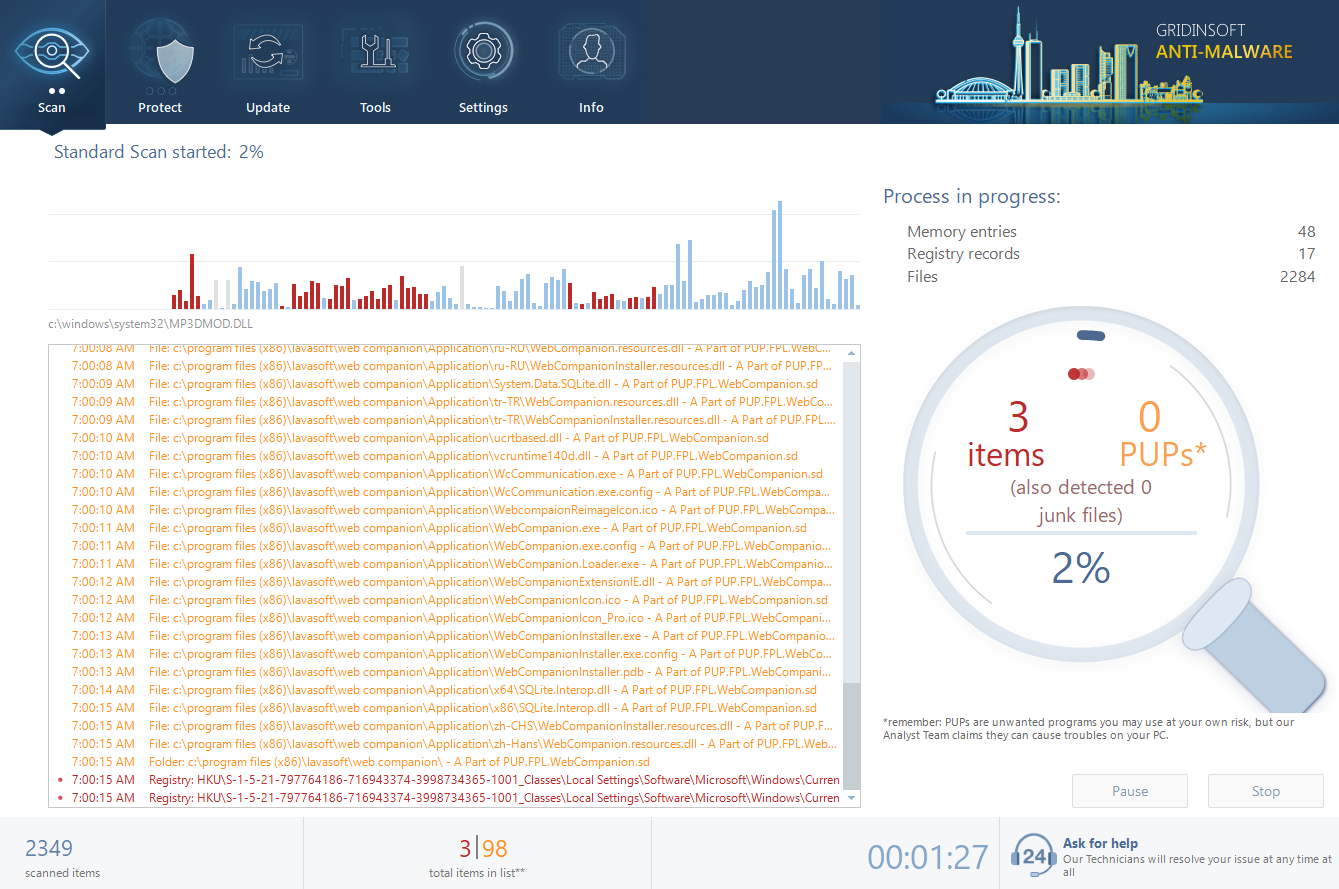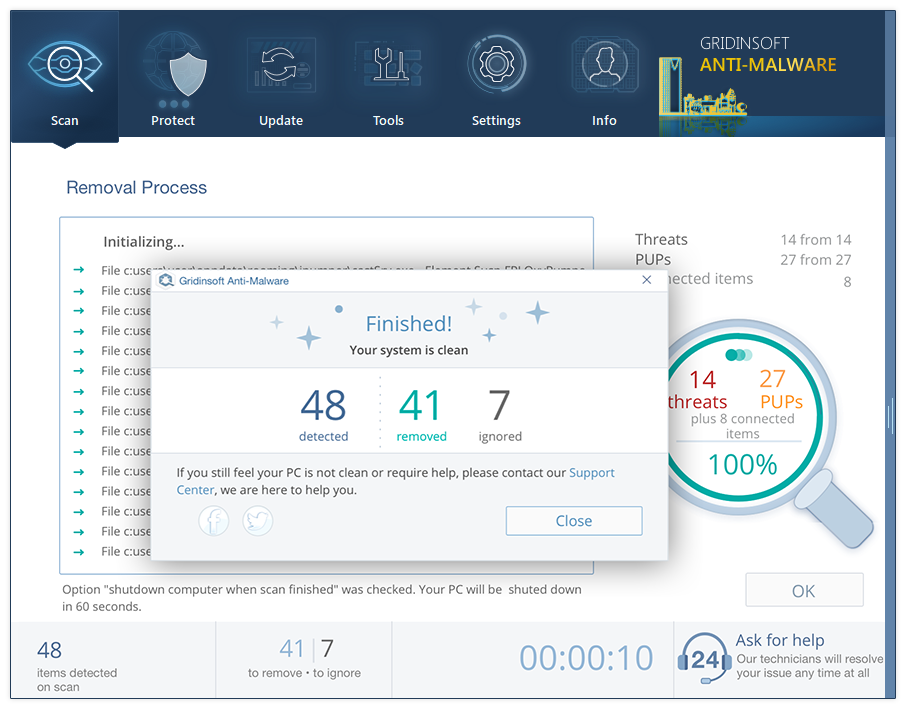Phemedrone, a malicious software written in the C# programming language, poses a severe risk to your computer. This insidious program has been specifically crafted to collect valuable information from your web browsers and applications, capturing files and stealing data. If you suspect that Phemedrone has infected your computer, it is crucial to take immediate action and remove this malware.
Unveiling the Dangers of Phemedrone
Phemedrone stealer is a versatile threat that can operate on both x32 and x64 systems. It cunningly employs an HTTP host to transmit all the stolen logs, enabling the attacker to remotely gather the pilfered information. To elude detection, this malware is equipped with various advanced features, including configurable anti-analysis, anti-virtual machine, anti-debugger, and mutex functionalities.
| Name | Phemedrone |
| Detection | Trojan:MSIL/FormBook |
| Damage | Phemedrone is a malicious software designed to gather system information, capture files, and steal data from web browsers and applications, including sensitive information like passwords, credit card details, and cryptocurrency wallets. |
| Fix Tool | See If Your System Has Been Affected by Phemedrone Virus |
One of the most alarming aspects of Phemedrone is its ability to extract a wide range of sensitive data. It can infiltrate Chromium-based and Gecko-based browsers, silently acquiring sensitive information like cookies, passwords, autofill data, and even credit card details. Moreover, this insidious software can intercept sessions from popular platforms such as Telegram, Steam, and Discord, further increasing the risk of data exposure. In addition, it is capable of pilfering files from infected systems, exacerbating the potential damage.
Furthermore, Phemedrone has the capacity to access sensitive information stored in crypto wallets. It can also provide an in-depth analysis of your system, including hardware specifications, geolocation data, operating system details, and even capture screenshots. Remarkably, it accomplishes all of this by directly gathering data in the system’s memory, eliminating the need for external libraries.
Victims of Phemedrone face numerous consequences due to the activities of this pernicious information stealer. The unauthorized access to sensitive data, such as passwords, credit card information, and cryptocurrency wallets, puts individuals at high risk of identity theft, financial losses, and potential misuse of personal accounts.
Moreover, the malware’s ability to collect system information and capture screenshots severely compromises privacy, leaving sensitive data exposed to unauthorized parties. With its sophisticated anti-detection features, Phemedrone evades easy detection and removal, prolonging its impact on the victim’s system and increasing the risk of continued data theft.
Understanding the Nature of Information Stealers
Information stealers, like Phemedrone and similar malware, share common characteristics that make them highly dangerous. Their primary objective is to gather sensitive information, including passwords, financial data, and personal details, from compromised systems. These malicious programs employ various techniques to avoid detection, employing functionalities such as anti-anti-virus and anti-virtual machine capabilities.
Furthermore, information stealers possess the ability to transmit the pilfered data to remote servers controlled by threat actors. They often target popular applications and browsers, maximizing their chances of obtaining valuable information from their victims. Notable examples of these information stealers include Wise Remote Stealer, ThirdEye Stealer, and RedEnergy Stealer.
How Did Phemedrone Invade Your Computer?
Your computer can fall prey to Phemedrone through various means. One prevalent method involves downloading and executing malicious files or attachments, such as infected email attachments or files obtained from untrustworthy sources. Visiting compromised or malicious websites and clicking on deceptive links or ads also puts your system at risk of malware infections.
Additionally, attackers exploit vulnerabilities in outdated software or unpatched operating systems to gain unauthorized access and infect your computer.
Safeguarding Your System Against Malware Installations
To prevent malware installations, it is crucial to keep your operating system and programs up to date with the latest security patches. This will minimize the risk of exploitation by malicious programs. Exercise caution when opening email attachments or clicking on links, especially if they originate from unknown or suspicious sources. It is recommended to use reputable antivirus software and ensure that it is regularly updated to scan for and remove any potential malware threats.
Furthermore, be mindful of the websites you visit and only download software from official and trusted sources, such as official websites and verified stores. Do not place your trust in advertisements that appear on suspicious websites. If you suspect that your computer has already been infected, we strongly advise running a scan with Gridinsoft Anti-Malware to automatically eliminate any infiltrated malware.
How to remove the Phemedrone from my PC?
Phemedrone malware is incredibly hard to erase by hand. It puts its data in several locations throughout the disk, and can get back itself from one of the elements. Moreover, a number of modifications in the windows registry, networking setups and Group Policies are really hard to discover and return to the initial. It is much better to make use of a special app – exactly, an anti-malware program. GridinSoft Anti-Malware will definitely fit the most ideal for malware elimination purposes.
Why GridinSoft Anti-Malware? It is pretty lightweight and has its databases updated just about every hour. In addition, it does not have such problems and weakness as Microsoft Defender does. The combination of these details makes GridinSoft Anti-Malware perfect for clearing away malware of any kind.
Remove the Phemedrone with GridinSoft Anti-Malware
- Download and install GridinSoft Anti-Malware. After the installation, you will be offered to perform the Standard Scan. Approve this action.
- Standard scan checks the logical disk where the system files are stored, together with the files of programs you have already installed. The scan lasts up to 6 minutes.
- When the scan is over, you may choose the action for each detected virus. For all files of Phemedrone the default option is “Delete”. Press “Apply” to finish the malware removal.



Frequently Asked Questions (FAQ)
Reformatting your storage device should only be considered as a last resort for removing Phemedrone malware. Prior to taking such drastic action, it is advisable to perform a comprehensive scan using trustworthy antivirus or anti-malware software.
Malware poses a significant risk to the security and privacy of sensitive information, potentially leading to identity theft, financial loss, and unauthorized access to personal accounts. Furthermore, it can disrupt the normal operation of a system, causing performance issues, system crashes, and data corruption.
The purpose of Phemedrone is to enable remote access and control of compromised devices. It allows threat actors to perform various malicious activities, such as unauthorized access, data theft, system manipulation, and disabling security measures, potentially causing significant harm to individuals and organizations.
Gridinsoft Anti-Malware has the ability to identify and eliminate most malware infections. Nevertheless, it is crucial to recognize that sophisticated malware can remain hidden deep within the system. Consequently, conducting a complete system scan is imperative to detect and eradicate malware.
How to Remove Phemedrone Malware
Name: Phemedrone
Description: Phemedrone is a malicious software designed to gather system information, capture files, and steal data from web browsers and applications, including sensitive information like passwords, credit card details, and cryptocurrency wallets.
Operating System: Windows
Application Category: Malware

